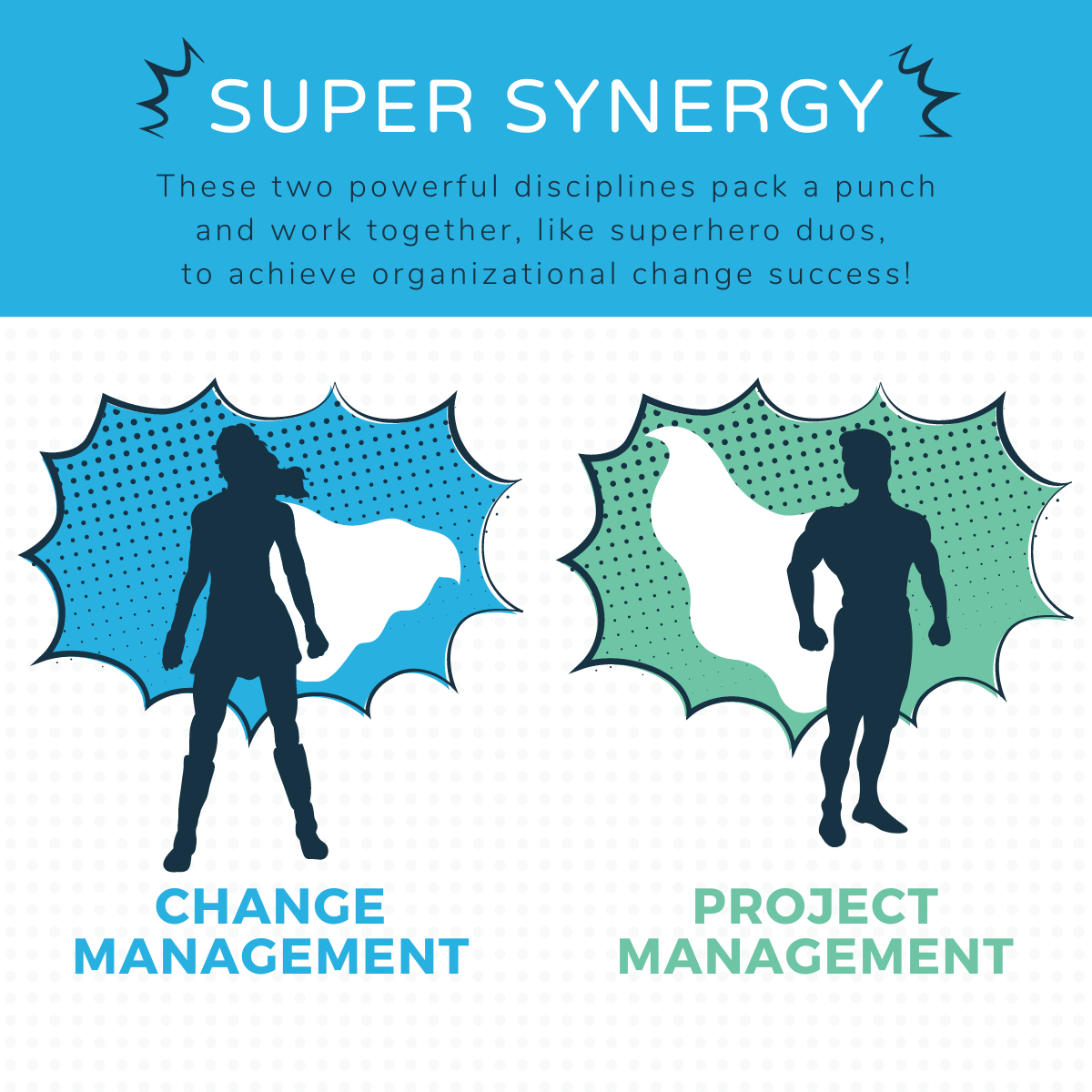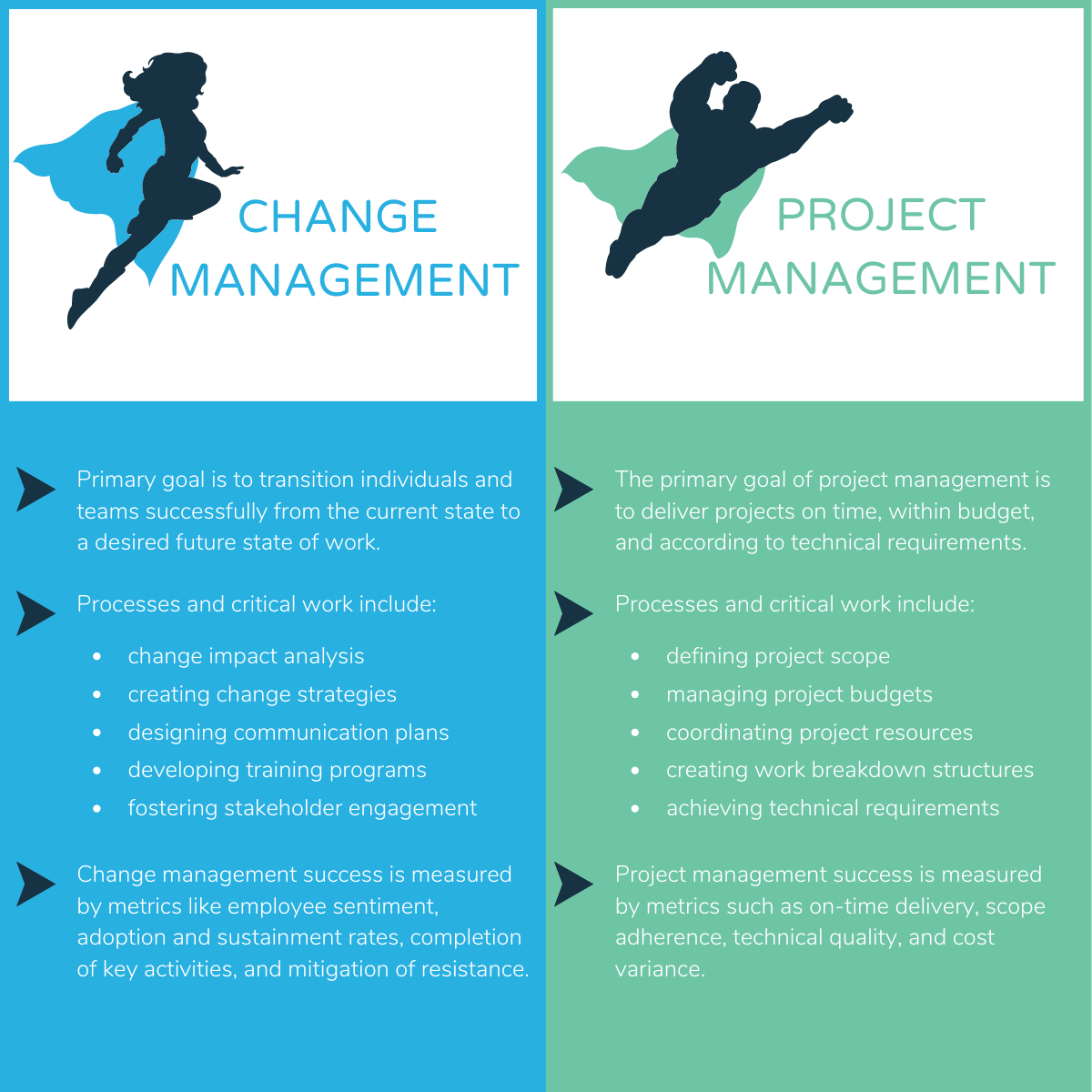Change management and project management: not the same, but a powerful, dynamic duo!

Are you tired of the misconception that change management and project management are the same, or worse, interchangeable? As a change professional, it's crucial to clarify the significant differences between these disciplines and showcase their unique contributions to organizational success. In this blog, we debunk the myth, providing a comprehensive understanding of how change management and project management complement each other while serving distinct purposes.

We often encounter the misconception that change management and project management are synonymous or even interchangeable. We hear things like:
"How is change management different than project management when it affects the same people?"
"You're part of the project team and budget, how is it any different?"
The truth is that both disciplines have some overlap, particularly regarding stakeholders, but they're more like a dynamic superhero duo working in harmony to achieve organizational change success. Like Captain America and Iron Man, or Batman and Superman, change management and project management are distinct but complementary, each bringing their unique set of tools, processes, and key performance indicators (KPIs) to the table.
In the dynamic landscape of change management, having the right tools at your disposal can make or break the difference between change success and change failure. While project management software is undoubtedly valuable, industry-specific change management software offers distinct advantages that cater specifically to the unique needs and challenges of change practitioners. In this article, we will explore why change management software tailored to your industry is a better alternative, highlighting its industry-specific workflows, specialized data capabilities, and tracking of key performance indicators (KPIs) vital to change management success.
First, let's spot the differences!
Project Management:
Project management is the structured approach of planning, organizing, and executing activities to achieve specific project requirements within defined constraints. The primary goal of project management is to deliver projects on time and within budget. This discipline emphasizes achieving specific technical objectives, meeting stakeholder expectations, and optimizing the utilization of project resources. Project managers are responsible for ensuring that the project's scope, schedule, budget, and deliverables are effectively managed throughout specific phases of a project's lifecycle.
Project management employs its own and activities such as defining the full project scope, creating work breakdown structures, developing project schedules, managing technical and deployment risks, coordinating project resources, and conducting project health evaluations. Their emphasis is on managing project deliverables, schedules, budgets, and risks.
Here are a few KPIs for project management:
- On-time delivery
- Cost variance
- Project scope adherence
- Quality metrics
- Customer feedback
Change Management:
Change management, on the other hand, is the systematic approach to preparing, supporting, and enabling people within an organization to adapt to and embrace one or many changes, which are often caused by a project. The fundamental purpose of change management work is to transition an organization's individuals and teams successfully from the current state to a desired future state. Change managers focus on minimizing stakeholder resistance, maximizing change adoption, and fostering a supportive environment for change. Their objective is to facilitate smooth transitions, minimize productivity disruptions, and ensure that people embrace and sustain the intended changes well after a project has concluded.
Change management uses its own processes and methodologies such as assessing change impacts, creating change strategies, designing communication plans, developing training programs, fostering stakeholder engagement, and measuring change adoption. Change managers focus on understanding the impact of change on individuals and the organization, creating strategies to address resistance, and enabling the successful implementation of new ways of working. This makes their metrics for success very different from project management.
Here are a few KPIs for change management:
- Stakeholder engagement
- On-time completion of strategic activities
- Managing levels of resistance
- Adoption rates
- Employee & stakeholder sentiment

Here's why change management software matters:
Project management platforms like Jira, Smartsheet, or SharePoint are undoubtedly powerful tools. However, they are designed to facilitate the specific work done by project management teams. Change management software provides change leaders with industry-specific workflows, specialized data and reports, and the ability to track change management KPIs. By leveraging software that understands the intricacies of change management, practitioners can enhance their efficiency, make more strategic decisions, and demonstrate the value of change management efforts to their leaders in a data-driven way.
Change management success relies on accurate data, insightful analytics, and evidence-based decision-making. Change software provides real-time data capabilities that are tailored to the specific requirements of change management professionals.
This means you can capture and analyze data including:
- Enterprise-wide levels of change effort
- Sentiment and feedback analysis
- Change risks and fatigue
- Change impact analysis
- Stakeholder analysis
- Engagement metrics
Using software as part of your change management approach offers several benefits to both change leaders and executives. It saves time by automating repetitive tasks, standardizes processes to ensure consistency and improve efficiency, and provides a centralized platform for collaboration, which helps teams work more effectively and reduces the risk of miscommunication. Additionally, change software offers better visibility and data analytics, enabling leaders to monitor progress, identify areas for improvement, hold stakeholders accountable, and make data-driven decisions.
By leveraging software that understands the complexities of change management in your industry, you can ensure a smoother and more efficient change management process. Embracing change management software unlocks the potential to drive successful transformation continuously and strategically. Ready to harness the power of change management software? Book a ChangeSync demo today!

